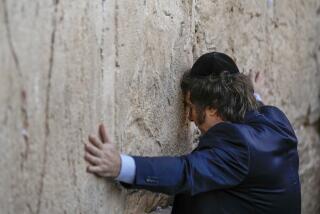Road to Justice Has Been Slow in Terror Case
- Share via
BUENOS AIRES — For years, the families have waited and hoped. They imagined a day when the terrorists who transformed an office building into a tomb would sit before a judge and be held to account for their crime. They imagined an international conspiracy exposed to the world.
But in South America, justice is not often swift. Only now are the men charged with the 1994 bombing of a Jewish community center here being brought to a courtroom to face charges--just as the world witnesses a swift military response to another, faraway act of terror.
“For many years, we have felt the rest of the world has been distant and apathetic to our cause,” said Luis Czyzewski, whose daughter was one of nearly 90 people killed when a car bomb brought down the Argentine-Jewish Mutual Assn. “It took Sept. 11 for people to realize that what happened here can happen anywhere.”
The 1994 bombing remains the worst crime of anti-Semitism in South American history. The trial of 20 Argentines charged in the attack got underway in earnest this month and is expected to last well into next year.
With the case grinding slowly forward, the Argentine media are alight with revelations and rumors that form a narrative with haunting similarities to the attacks on New York and the Pentagon.
Here too there is talk of Middle Eastern operatives with European connections, of mysterious men moving back and forth across the Atlantic in the days before the attack. And also a tragic recounting of the moment when lives were cut short as a building imploded with “a horrendous sound of thunder.”
“This will be an example that it’s possible to judge terrorism and place it on trial,” prosecutor Jose Barbaccia said as the trial began last week.
Each working day, the accused, a group composed mostly of former policemen, are escorted under heavy guard to a courtroom specially built for their trial in an old movie theater near the port.
“What we are seeing in this trial are only the local connections,” said Javier Astigarraga, a Buenos Aires attorney who investigated the crime on behalf of the victims. “This case is in every aspect an international matter.”
Prosecutors have long suspected that the bombing was orchestrated by the Iranian government. Theories abound about a possible motive, many linked to the political career of then-President Carlos Menem, a dapper son of Syrian immigrants with close ties to this nation’s large Arab community.
Menem is now under house arrest in a Buenos Aires mansion on arms-trafficking charges unrelated to the bombing. But according to published reports here, he may soon be subpoenaed to testify about the 1994 attack before Judge Juan Jose Galeano, who is conducting investigative hearings that run parallel to the criminal trial.
The most recent revelations surround a man identified in court documents as “Witness C,” an Iranian living in exile in Germany. In a report published last week in the Argentine daily Pagina 12, Witness C is said to have told Galeano that the Iranians carried out the attacks in Argentina because they believed Menem would protect them from any investigation.
Also in recent weeks, investigators have leaked details of a series of classified diplomatic cables, sent by the Argentine Embassy in Tehran, the Iranian capital, a week after the attacks. The cables named an Iranian diplomat as the possible architect of the crime. He is said to have entered Argentina four days before the bombing on a flight with Iran’s ambassador to Chile.
Galeano is expected to subpoena Menem to question him about the cables. The country’s former foreign minister and other high-ranking officials of the administration may also be subpoenaed.
A spokesman for Menem declined to comment until the former president is officially summoned. The Menem administration--in power until 1999--never proved a link to Iran in the case. The Iranian government has denied responsibility.
The defendants in the trial are all Argentines--police officials, small-time businessmen and petty criminals. The two leading suspects are Carlos Telledin, a mechanic linked to the car used in the attack, and Juan Jose Ribelli, a provincial police commander.
Prosecutors are expected to call more than 1,000 witnesses.
“This is only a small step,” Czyzewski said. Like other relatives of the victims, he regularly attends the trial, trying to catch a glimpse of the defendants through thick panes of bulletproof glass.
“I didn’t feel anything when I saw them,” Czyzewski said. But he was brought to tears when prosecutors--as part of their opening arguments--described the injuries that killed his daughter Paola. “It was the first time I had heard how she died.”
In the years since the bombing, the community center has been rebuilt with a modern, fortress-like architecture. Votive candles burn at a sidewalk memorial where a large sign proclaims, “Remember the pain that never ends.”
More to Read
Sign up for Essential California
The most important California stories and recommendations in your inbox every morning.
You may occasionally receive promotional content from the Los Angeles Times.











